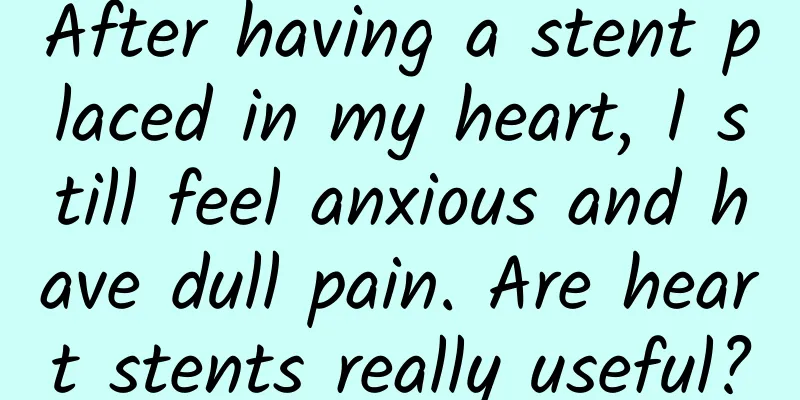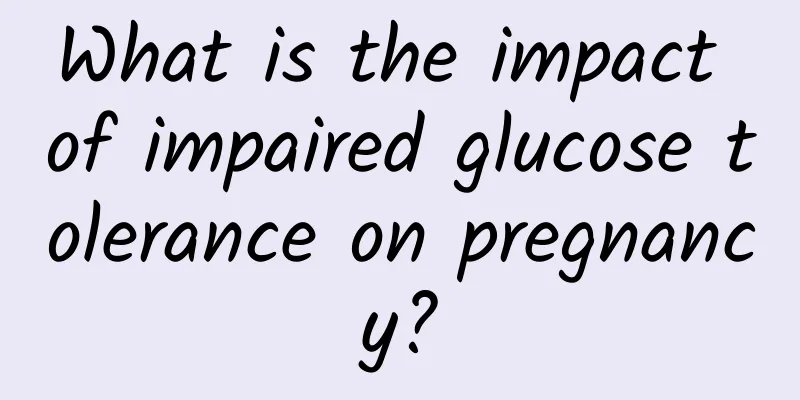After having a stent placed in my heart, I still feel anxious and have dull pain. Are heart stents really useful?

|
An elderly friend told Huazi that he had coronary heart disease and had a stent placed in his heart three months ago. He has now been discharged from the hospital and returned home. But he still feels anxious from time to time, and has dull pain in his chest. Is this normal? Why does he still have symptoms after having a heart stent placed in his heart? Is it really useful? Huazi told him that it was recommended that he go to the hospital for a check-up to see if it was a heart problem, or if the symptoms might be caused by other problems. 1. Heart stents are really useful It is certain that heart stents are really useful in treating coronary heart disease. If they were not useful, the country would not have gone to such great lengths to include heart stents in the national centralized procurement and cut the price of heart stents from the original 13,000 yuan to 700 yuan. The formation mechanism of coronary heart disease is that atherosclerosis occurs in the coronary arteries. Hardened plaques will cause the narrowing of the arteries and affect the blood supply of the heart itself. When the narrowing degree of the coronary artery exceeds 50%, coronary heart disease can be diagnosed. If the degree of stenosis exceeds 70%, it will seriously affect the blood supply to the heart and limit daily activities. However, current medicine cannot reverse atherosclerosis, and drugs can only delay the progression of plaques. However, heart stents can open narrowed coronary arteries, restore blood supply, improve quality of life, and are also an effective means of rescuing acute myocardial infarction. 2. Pay attention to heart problems. If you still experience palpitations and heartaches after stent surgery, you need to check whether there is myocardial ischemia. Because heart stents are foreign to the human body, although there are drugs that inhibit proliferation and anti-platelet aggregation, restenosis may still occur in the stent. There may also be stenosis in arteries in other parts of the heart. Also pay attention to whether there is arrhythmia. For patients with severe coronary heart disease and myocardial infarction, atrial fibrillation, ventricular tachycardia, bradycardia and other arrhythmias may occur. If the situation is serious, further treatment is required. These problems need to be confirmed by electrocardiogram, cardiac ultrasound, CTA, coronary angiography and other examinations in the hospital. 3. It may be neurosis. Some patients may have palpitations and chest pain after stent surgery. Due to emotional reasons such as fear and anxiety, the excessive mental tension will make the sympathetic nerves overexcited, resulting in an accelerated heart rate and palpitations. The human body's ribs move with breathing every day, and the muscle-bone joints connected to the sternum will be strained and stimulate the adjacent nerves, causing pain. Usually this pain is very weak and will be ignored under normal circumstances. However, people with mental stress will magnify the tiny pain in the body and mistake it for "heart pain." Women in menopause, hyperthyroidism, anxiety disorders, and insomnia are more likely to have this illusion. 4. Maintain an optimistic attitude and actively treat the disease. After heart stent surgery, no matter what the cause of palpitations and dull pain is, you need to go to the hospital for examination to determine the cause, instead of just imagining it. If there is really a problem, imagining it may delay the disease; even if there is no problem, it may aggravate the symptoms of neurosis and cause panic attacks. Although the current medical level cannot cure coronary heart disease, it can delay the progression of the disease, stabilize the condition, and improve the quality of life. Therefore, you should maintain an optimistic attitude, take medication regularly under the guidance of a doctor, control your blood pressure, blood lipids and blood sugar, quit smoking and drinking, eat less, and avoid overwork, so that you can still enjoy a high-quality life. In summary, heart stents are an effective means of treating coronary heart disease and acute myocardial infarction. If you experience symptoms of palpitations and dull pain after heart stent surgery, you need to see a doctor for a detailed examination to find the root cause of the problem. Following the doctor's advice for treatment and maintaining an optimistic attitude are the "magic weapons" to overcome all diseases. If you have any questions about medication and treatment, consult a doctor and pharmacist in time. I am pharmacist Huazi. Welcome to follow me and share more health knowledge. |
<<: How can money and life be equal?
Recommend
The reasons why women lose their hair
It's not just men who devote themselves to wo...
How to remove soft contact lenses correctly
This is the 4209th article of Da Yi Xiao Hu Highl...
Is it normal to have less morning sickness at 7 weeks of pregnancy?
Expectant mothers who suffer from severe morning ...
What are the benefits of drinking honey lemon water? Can I drink honey lemon water when I have internal heat?
Honey lemon water is rich in vitamin C, which has...
How to care after uterine prolapse surgery?
Generally speaking, people will be very weak afte...
No bleeding on the 5th day of medical abortion, endometrial thickening
If there is no plan to have a baby in the short t...
What should a virgin do if her vagina becomes dry? These measures can help you
Normally, if a woman has not had sex, she will no...
How does it feel to have a urinary catheter inserted in a woman?
Inserting a urinary catheter is a very common phe...
Tips on how to get your period early
Menstruation is a physiological phenomenon that o...
Can I detect pregnancy ten days after having sex during ovulation?
For couples who want a baby, if they have sex dur...
What is the problem of increased and thinning leucorrhea?
The normal and healthy leucorrhea of women is c...
Attack of the Fatty
This is the 3182nd article of Da Yi Xiao Hu As th...
How many hours is sperm fertility
Women who want to have children usually pay more ...
"Face-to-face interview with microbes" - Human papillomavirus
Author: Wang Wanying, Xi'an Medical College, ...
Can I chew gum when I'm pregnant?
Chewing gum is a snack that is popular among the ...









